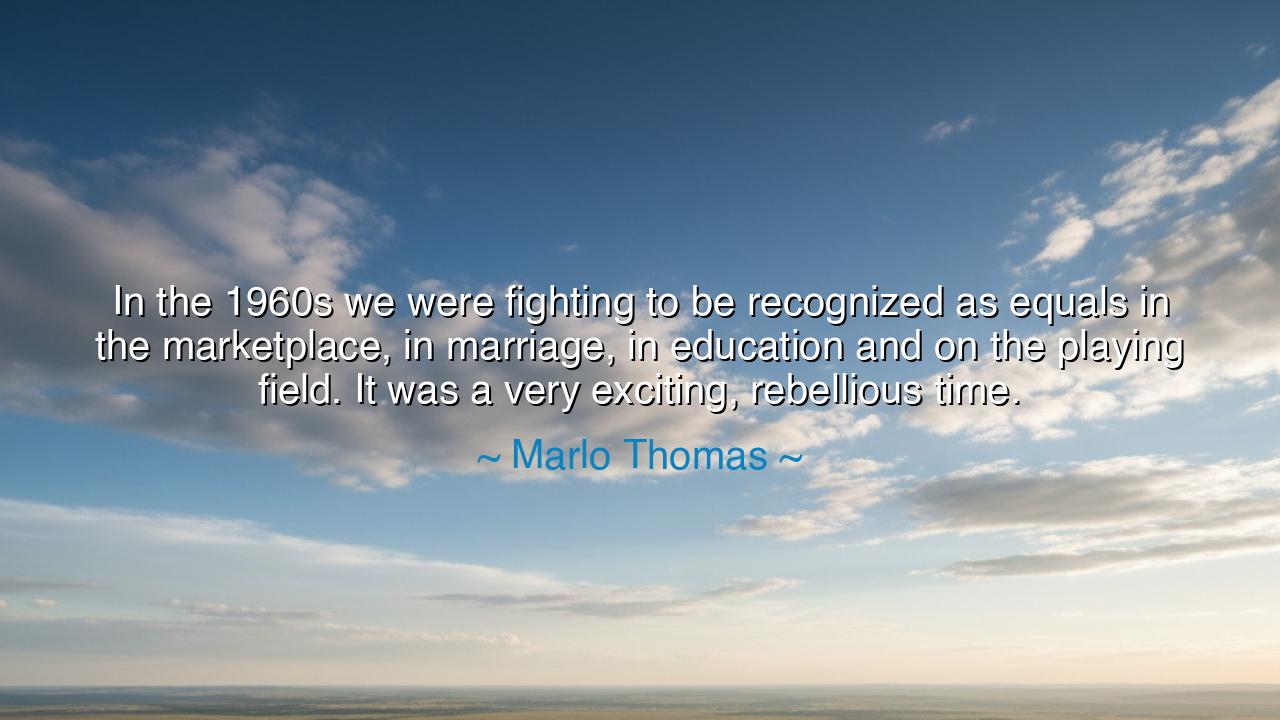
In the 1960s we were fighting to be recognized as equals in the
In the 1960s we were fighting to be recognized as equals in the marketplace, in marriage, in education and on the playing field. It was a very exciting, rebellious time.






Hear, O children of freedom, the words of Marlo Thomas, a daughter of courage and voice of her generation: “In the 1960s we were fighting to be recognized as equals in the marketplace, in marriage, in education and on the playing field. It was a very exciting, rebellious time.” These words rise like the sound of drums from a distant age—an age of awakening, when men and women, young and old, dared to dream of equality. Her voice speaks not only of rebellion, but of transformation, for the 1960s was not merely a decade—it was a storm that broke the old chains and cleared the sky for a new dawn of justice.
In her memory, Marlo Thomas recalls an era when the air itself seemed charged with change. Women, long bound by quiet expectation, began to raise their voices and demand to be seen, not as ornaments of home, but as equals in the marketplace, capable of labor and leadership. They marched for the right to shape their own destinies, to learn, to compete, to build. It was not an easy rebellion; it was a rebellion of dignity. The old order trembled as a generation declared that gender would no longer determine worth. To stand up then was to risk ridicule, rejection, and even ruin—but they stood nonetheless.
This struggle was not confined to women alone. It was a human revolution, one that sought fairness for all who had been silenced or unseen. The marketplace became a battleground for wages and recognition; marriage, once a cage of inequality, began to open its doors to partnership and respect; education, long guarded by privilege, began to welcome the minds of women; and even the playing field, that sacred space of competition, was forced to reckon with the truth—that talent has no gender. These were not small battles; they were the fires that reshaped civilization’s very heart.
Think of Billie Jean King, who in 1973 faced Bobby Riggs in the “Battle of the Sexes.” With every swing of her racket, she carried the weight of millions of women who had been told they were not strong enough, not capable enough, not equal. When she triumphed, she did more than win a tennis match—she shattered a symbol. The crowd cheered, but beyond the stadium, countless girls and women lifted their heads higher, knowing that the walls around them were cracking. It was the living embodiment of what Marlo Thomas spoke of—a rebellious time where belief became victory.
And Marlo herself was no bystander to this movement. With her groundbreaking television series That Girl, she gave the world Ann Marie, a young, single woman who chose independence over dependence, career over conformity. At a time when women on screen were often confined to kitchens or love stories, That Girl declared: a woman’s story could be her own. Marlo Thomas did not just describe the rebellion—she lived it, shaping the imagination of a generation.
The 1960s, then, was not simply about protest—it was about becoming. It was the age when women began to see themselves not as shadows of men, but as full beings of light. It was when society began to understand that equality was not a gift to be granted, but a right to be recognized. And yes, as Marlo said, it was an exciting time, for all true revolutions are alive with both danger and possibility. It was also rebellious, for rebellion is the heartbeat of progress—the refusal to accept injustice as destiny.
From her words we must draw this lesson: the fight for equality is never finished. Each generation must rise again to defend and expand the freedom won by those before. The world may grow more subtle in its inequalities, but the spirit of rebellion—righteous and wise—must never fade. Stand where injustice stands, speak where silence reigns, and act where complacency lulls. For to be truly human is to seek balance, to honor the dignity of every soul, whether in the marketplace or the home, in the classroom or the field.
So remember, my children of the present age: the rebellion of the 1960s was not a storm that passed—it was a torch that burns still. Take it up with courage. Let your own time be one of justice, creativity, and compassion. For when men and women stand as equals, the world itself stands taller. And in that harmony, perhaps, we shall glimpse the Heaven that all rebels of righteousness dream of.






AAdministratorAdministrator
Welcome, honored guests. Please leave a comment, we will respond soon